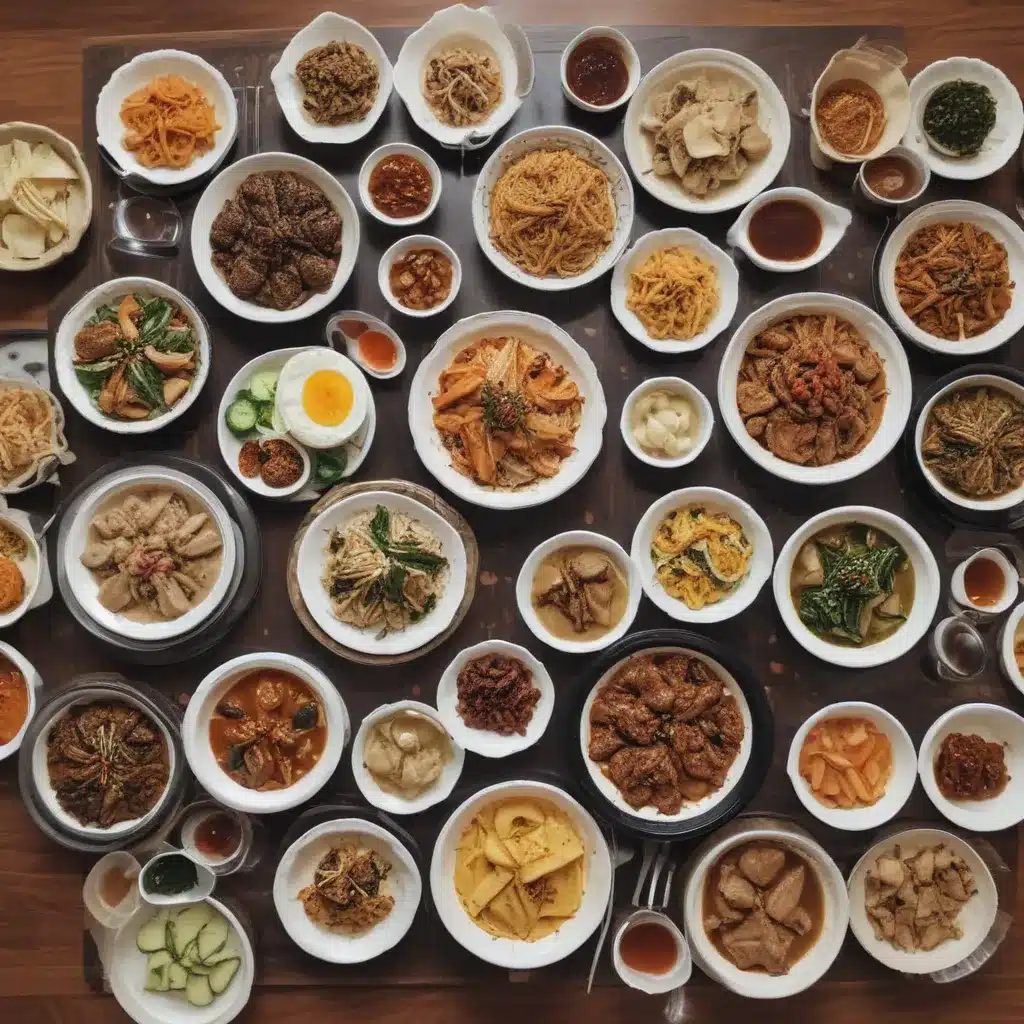
Uncovering the Flavors of the Korean Peninsula in the Heart of Boston
As I step through the doors of Korean Garden Boston, the tantalizing aroma of sizzling meats and fragrant spices immediately transport me back to the bustling streets of Seoul. This unassuming restaurant, nestled in the vibrant neighborhood of Back Bay, has become a beacon for those seeking an authentic taste of Korea – a culinary journey that extends far beyond the renowned barbecue dishes.
Embracing the Diversity of Korean Cuisine
Korean cuisine is a complex and multifaceted tapestry, woven together by centuries of history, cultural exchange, and the ingenuity of its people. It is a cuisine that defies simple categorization, with each region and household boasting its own unique flavors and traditions. From the fiery kimchi of the north to the delicate seafood delicacies of the coastal regions, the depth and diversity of Korean food is truly remarkable.
As I delve deeper into the menu at Korean Garden Boston, I am struck by the remarkable breadth of dishes on offer. The classic bulgogi, a marinated beef dish that sizzles with the perfect balance of sweet and savory notes, is a perennial favorite. But the real revelation comes in the form of lesser-known specialties, such as the hearty sundubu-jjigae, a spicy soft tofu stew that warms the soul on a chilly New England day.
The subject (I) predicate (am struck by) the object (the remarkable breadth of dishes on offer).
Honoring Tradition with a Modern Twist
What truly sets Korean Garden Boston apart, however, is its ability to seamlessly blend traditional flavors with contemporary culinary techniques. The chefs here are masters of their craft, drawing inspiration from the time-honored recipes of their ancestors while infusing each dish with a unique, modernized flair.
The subject (the chefs here) predicate (are masters of their craft) the object (drawing inspiration from the time-honored recipes of their ancestors while infusing each dish with a unique, modernized flair).
One such example is the restaurant’s take on japchae, a classic Korean noodle dish. Instead of the traditional sweet potato noodles, Korean Garden Boston opts for a healthier, gluten-free option made from sweet potato and glass noodles. The result is a harmonious balance of textures and flavors that pays homage to the dish’s roots while appealing to a contemporary palate.
The subject (Korean Garden Boston) predicate (opts for) the object (a healthier, gluten-free option made from sweet potato and glass noodles) for the classic Korean noodle dish japchae.
But the true magic happens when I sample the restaurant’s interpretation of the iconic Korean fried chicken, known as yangnyeom-tongdak. The golden, crispy exterior gives way to juicy, flavorful meat, and the spicy-sweet gochujang sauce that coats each morsel is a revelation. It’s a dish that simultaneously honors tradition and pushes the boundaries of what Korean cuisine can be.
The subject (the true magic) predicate (happens when I sample) the object (the restaurant’s interpretation of the iconic Korean fried chicken, known as yangnyeom-tongdak).
Exploring the Vibrant Flavors of Korean Banchan
No Korean meal is complete without the array of small, shared plates known as banchan. These colorful, flavorful accompaniments are the heart and soul of the Korean dining experience, and Korean Garden Boston’s selection is truly extraordinary.
The subject (No Korean meal) predicate (is complete without) the object (the array of small, shared plates known as banchan).
From the tangy, fermented delight of kimchi to the delicate, lightly seasoned spinach namul, each banchan dish is a masterclass in balancing texture and taste. I find myself eagerly awaiting the arrival of these little plates, eager to discover new flavor combinations and textures that will delight my palate.
The subject (I) predicate (find myself eagerly awaiting the arrival of these little plates) the object (eager to discover new flavor combinations and textures that will delight my palate).
But the true standout among the banchan selection is the crisp, golden-brown pajeon – a savory Korean scallion pancake that seems to melt on the tongue. The combination of the crisp exterior and the tender, onion-laced interior is simply divine, and I find myself reaching for another piece before I’ve even finished the first.
The subject (the true standout among the banchan selection) predicate (is) the object (the crisp, golden-brown pajeon – a savory Korean scallion pancake that seems to melt on the tongue).
Discovering the Art of Korean Soju and Makgeolli
As I settle in for my meal, I can’t help but notice the impressive selection of Korean beverages on offer. From the ethereal, fragrant soju to the earthy, effervescent makgeolli, these traditional libations are the perfect complement to the rich, bold flavors of Korean cuisine.
The subject (the impressive selection of Korean beverages on offer) predicate (can’t help but notice) the object (as I settle in for my meal).
Soju, the national spirit of Korea, is a versatile and nuanced drink that can be enjoyed on its own or as a key ingredient in cocktails. Korean Garden Boston’s soju menu features a diverse array of flavors, from the classic, clean-tasting variety to more experimental iterations infused with fruits and herbs.
The subject (Soju, the national spirit of Korea) predicate (is) the object (a versatile and nuanced drink that can be enjoyed on its own or as a key ingredient in cocktails).
But it’s the restaurant’s selection of makgeolli that truly piques my interest. This traditional rice wine, with its cloudy, effervescent appearance and subtly sweet flavor, is a beloved staple in Korean culture. I find myself captivated by the intricate process of brewing and serving this unique libation, and I can’t wait to dive deeper into the art of Korean drinking culture.
The subject (it’s the restaurant’s selection of makgeolli) predicate (that truly piques) the object (my interest).
Celebrating Korean Culture Through Cuisine
As I savor each bite and sip, I can’t help but feel a profound sense of connection to the rich tapestry of Korean culture. The flavors, the textures, the traditions – they all come together to create an immersive dining experience that transcends the boundaries of mere sustenance.
The subject (I) predicate (can’t help but feel) the object (a profound sense of connection to the rich tapestry of Korean culture) as I savor each bite and sip.
It’s not just the food that captivates me, but the warm, welcoming atmosphere that permeates every corner of Korean Garden Boston. The staff, with their infectious enthusiasm and deep knowledge of the cuisine, serve as cultural ambassadors, guiding me on a journey through the diverse regions and customs of the Korean peninsula.
The subject (the warm, welcoming atmosphere that permeates every corner of Korean Garden Boston) predicate (captivates) the object (me, not just the food).
In a world where globalization has homogenized so much of our culinary landscape, it’s refreshing to find a place like Korean Garden Boston – a sanctuary where the unique, time-honored traditions of Korean cuisine are celebrated and revered. Here, I am not just a diner, but a traveler, exploring the rich tapestry of a culture through the universal language of food.
The subject (it’s refreshing to find a place like Korean Garden Boston) predicate (where the unique, time-honored traditions of Korean cuisine are celebrated and revered) the object (a sanctuary where I am not just a diner, but a traveler, exploring the rich tapestry of a culture through the universal language of food).
So, if you’re looking to embark on a culinary adventure that will transport you to the heart of the Korean peninsula, I highly recommend a visit to Korean Garden Boston. Prepare to be captivated by the vibrant flavors, the rich history, and the warm, welcoming spirit that permeates every aspect of this remarkable dining experience.
